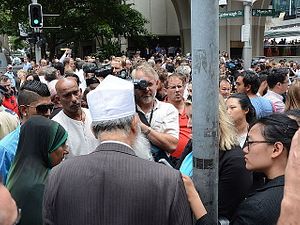Sydney’s hostage siege ended 2 a.m. Tuesday, when police raided the Lindt cafe in Martin Place and killed the gunman, Man Haron Monis. Two hostages, Tori Johnson and Katrina Dawson are also dead and six hostages were taken to hospital. One police officer was also injured and taken to hospital. A full rundown of the events can be seen here.
Terrorism has become a focus in Australia this year. We’ve previously written on the metadata retention laws, and the “security theater” of the earlier terror raids in Sydney that did not result in any convictions. Last month, Foreign Minister Julie Bishop addressed the UN Security Council on the need to combat homegrown terrorism. However much of Australia’s concern has been over young Australians travelling overseas to fight with ISIS. Passports have been cancelled, arrests made and police attacked and a perpetrator shot. Yet in this case even the prime minister acknowledges that this individual, although already known to police, slipped through the net. A full report will be undertaken, and made public, he says.
In fact, it seemed to some this year, with a purported “burqa ban” in parliament and a general ban proposed by politicians Cory Bernardi and Senator Jacqui Lambie, Liberal and Independent senator, respectively, that the country and its leaders were becoming increasingly biased against Muslims. As we wrote here two days ago, however, Prime Minister Tony Abbott urged caution against coming rapidly to conclusions even as he called the events “devastating.”
After the attack, Abbott refused to link Islam to the attack, claiming that the pope isn’t blamed for the actions of the IRA and calling the gunman Man Harmon Monis “a deeply unstable individual with a long history of mental illness.” He also stuck to his guns in naming what is generally called the IS or Islamic State the “ISIL Death Cult.” Though previously its hyperbole grated on some, Abbott explained that there was little either Islamic or state-like in the group’s actions.
He also said that Australians certainly had the right to question why this had been allowed to happen and why the gunman, “Sheik” Man Haron Monis had been left at large in the community despite a long criminal history known to Australian authorities; he was also wanted for extradition back to Iran on fraud charges. In fact, as was reported in news here some years ago, Melbourne Shia Muslim leader Kamal Mousselmani asked the Australian Federal Police to investigate him. Monis was also put on a two year good behavior bond and 300 hours community service after writing offensive letters to the families of soldiers killed in Afghanistan and a trade official killed in the 2009 Jakarta bombing. In 2002, he faced a total of 40 charges of sexual and indecent assault of several women. He has also been accused of being an accessory to his ex-wife’s murder.
“The system did not adequately deal with this individual, there is no doubt about that,” said Tony Abbott, who repeatedly pointed out that despite the “deranged individual’s” Islamic sentiments he did not remotely represent the religion. It is not only Abbott who has been rushing to defend Muslims against possibly reprisals and blame. Even before the hostages were free or the identity of their captor known, the hashtag #Illridewithyou had gone viral, expressing solidarity with Muslims in light of any possible reprisals.
Perhaps inevitably the reporting of the event has come under as much scrutiny as the event itself, with numerous commentators writing about the coverage or even writing their own commentary on someone else’s commentary on the coverage. Given Monis took his hostages in the hope of getting his message out and deputized cafe staff to call varied media outlets on his behalf, this was always going to be a media event. The Lindt cafe is opposite the offices of broadcaster Channel Seven. According to the Guardian, “No one had paid attention: not politicians, not the media, not the judges. He had written manifestos and letters, he had launched court challenges, and chained himself to parliament. Now, finally, he had a platform to make people listen. And they would listen to his message only.” Except few of those messages were broadcast. In general, despite the odd clanger, the coverage has tended towards the cautious, with the faces of hostages blurred in newscasts when they appeared in cafe windows holding a flag containing the Shahada, though the echo chamber of reporters standing outside telling news casters what they don’t yet know was common across all networks Monday.
Meanwhile Rupert Murdoch is under fire for this insensitive tweet: AUST gets wake-call with Sydney terror. Only Daily Telegraph caught the bloody outcome at 2.00 am. Congrats.
The bombast of the paper’s special 2 p.m. edition of Tuesday, calling the event “The Instant We Changed Forever” and immediately linking the crisis to ISIS also came in for some criticism. Monis may not have been an “official” member of the group, but on taking the hostages he did indeed tell them he was from ISIS and that it was a terrorism attack.
What happens now? Grieving, first. Sydneysiders quickly built a memorial full of bunches of flowers to honor the dead. But it seems the questions are only beginning.
Helen Clark was based in Hanoi for six years as a reporter and magazine editor. She has written for two dozen publications including The Diplomat (as Bridget O’Flaherty), Time, The Economist, the Asia Times Online and the Australian Associated Press.

































